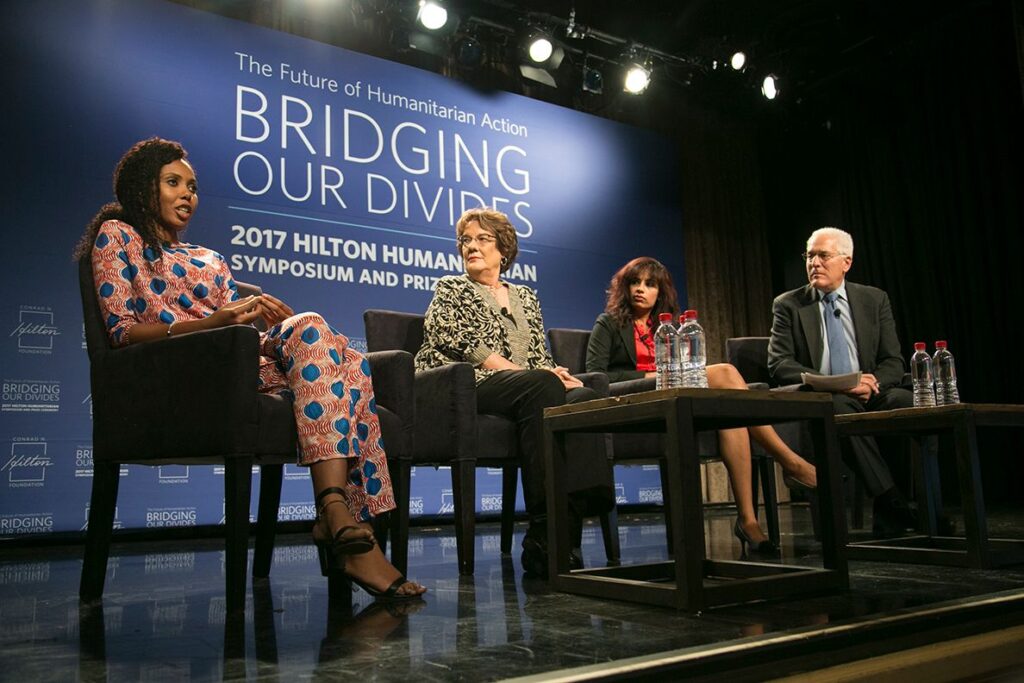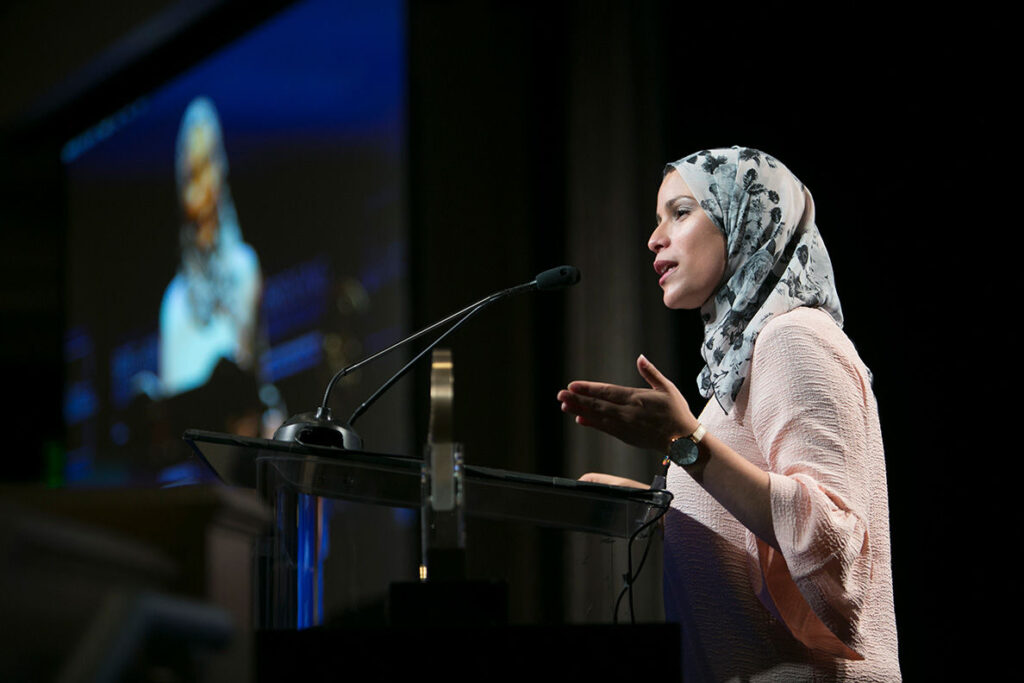Nearly 300 individuals came to The Beverly Hilton to attend the 2017 Hilton Humanitarian Symposium and Prize Ceremony, honoring the 2017 Hilton Humanitarian Prize recipient, icddr,b. This year’s symposium was guided by the theme The Future of Humanitarian Action: Bridging Our Divides. This topic was addressed by a diverse line-up of speakers including: Pulitzer Prize-winning photojournalist Lynsey Addario; Founder of The Chopra Foundation and Co-founder of Jiyo and the Chopra Center Deepak Chopra, MD; Devex President and Editor-in-Chief Raj Kumar; News Deeply CEO an Executive Editor Lara Setrakian; Search for Common Ground President and CEO Shamil Idriss; and many more.

Building on the remarks of 2016 event speaker Zainab Salbi, Hilton Foundation President and CEO Peter Laugharn opened the event calling on the audience to be bridge-builders: “Whether you’re in a nonprofit, government, business, academia, global health, philanthropy—you have a role to bring people together. And you all know, we have a tremendous amount of divides to overcome these days—religious, political, economic, racial, social.”
This was the first time in 20 years that the Foundation hosted the event in Los Angeles and the city’s mayor, Eric Garcetti, set the stage for the day’s discussion of bridging divides, addressing Los Angeles and beyond in his morning address: “I would challenge every Angeleno to think of the world we want 11 years from now—a place of justice, a place of health, a place of opportunity, a place of true humanity, where we cross the borders not to flee, but to find one another.”
The event also coincided with International Day of the Girl. Fittingly, a panel discussion with Safe Hands for Girls Founder Jaha Dukureh, Tostan Founder Molly Melching, and Sahiyo Founder Mariya Taher stressed the need to empower victims of female genital mutilation (FGM) to speak out about their experiences and engage local and global communities respectfully, but also urgently to respond to the horrific statistics that every day, 6,000 girls are cut. When speaking about her advocacy efforts in The Gambia, Dukureh noted, “For us it wasn’t about being careful. It was about letting our fathers, our religious leaders, our politicians know that this [FGM] is no longer okay with our generation.”

During the luncheon, Dr. Clarence B. Jones—former speechwriter and counsel to Dr. Martin Luther King, Jr.—delivered a moving speech, recalling conversations with King, which continue to provide keen insight to the humanitarian response to the challenges we face today. He noted, “On some questions, my beloved brother [King] would say… ‘There comes a time when one must take the position that is neither safe, nor politic, nor popular, but he must do it because conscience tells him it is right. I believe today that there is a need for all people of goodwill to come with a massive act of conscience.’” Dr. Jones then challenged the audience, “So again, I ask, tell me where again is our moral compass of America today?”

“So again, I ask, tell me where again is our moral compass of America today.”
The rest of the afternoon was dedicated to learning about and celebrating the 2017 Hilton Humanitarian Prize recipient, icddr,b, a Bangladesh-based public health research institution that finds innovative solutions to major health challenges in its host country that have worldwide impact.

During the Prize Ceremony, Peter Laugharn lauded this year’s recipient for their incredible track record. “For more than 50 years, icddr,b has been at the forefront of low-cost, innovative health solutions that have resulted in saving tens of millions of lives globally. icddr,b has had a profound impact on health crises and solutions worldwide, and has shown that innovation and breakthroughs can come from all parts of the globe.” He then introduced the incomparable Dr. Alaa Murabit, UN High-Level Commissioner and SDG Global Advocate, who delivered a deeply moving and inspiring presentation about the role of women and girls in building and carrying out successful peacebuilding processes. She then introduced Dr. John Clemens, Executive Director of icddr,b, who accepted the award.
For more than 50 years, icddr,b has been at the forefront of low-cost, innovative health solutions that have resulted in saving tens of millions of lives globally. icddr,b has had a profound impact on health crises and solutions worldwide, and has shown that innovation and breakthroughs can come from all parts of the globe.

Following the Prize Ceremony, Professor Fred Binka, Roger I. Glass, MD, PhD, and Dr. Firdausi Qadri sat down to a rich discussion about the South’s role in achieving global health goals, and key lessons from icddr,b.
The afternoon ended with a celebratory cocktail reception where audience members were invited to salute the accomplishments of icddr,b, surrounded by a panoramic view of Los Angeles. In closing, Peter Laugharn noted, “It is imminently clear that Los Angeles is ready to tackle challenges.”